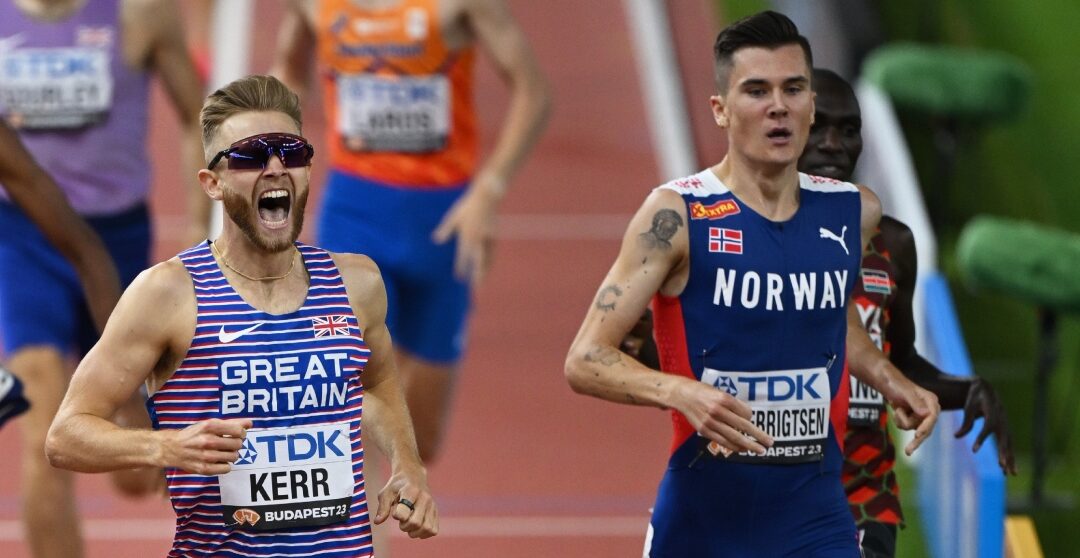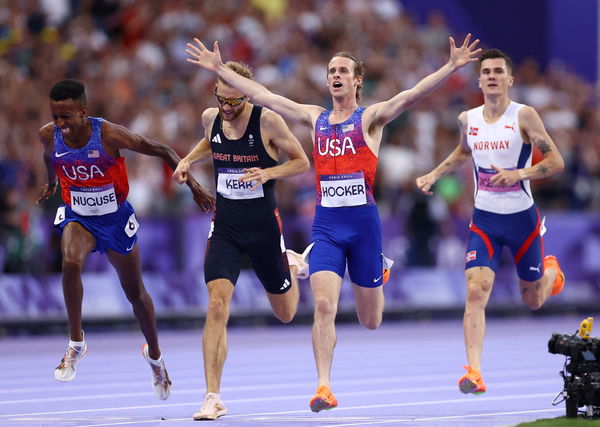

Few rivalries in athletics today command as much attention as the ongoing duel between Jakob Ingebrigtsen and Josh Kerr. What began as a series of routine contests in junior competitions has developed into a bitter and unpredictable battle for supremacy in the 1500 meters. Their confrontations are not merely about times on the clock but about style, tactics, and pride. Each time they line up together, the anticipation extends beyond the race itself to the verbal exchanges before and after.
Watch What’s Trending Now!
The growing intensity stems from the fact that Ingebrigtsen, once the undisputed standard in the event, no longer finds victory guaranteed. Kerr has closed the gap with championship titles, national records, and a strong finishing kick that has undone the Norwegian’s carefully laid strategies. The contests between the two are not simply races; they are exhibitions of contrasting approaches to middle-distance running, layered with a history of wins and losses that continues to shift the balance of power.
ADVERTISEMENT
Head-to-head record: How do Jakob Ingebrigtsen and Josh Kerr compare?
Their first encounter dates back to the 2016 U20 World Championships. Jakob placed ninth in 3:51.09 while Kerr finished tenth in 3:51.23. The result appeared ordinary at the time, but it marked the beginning of a long-running series that would define their careers. Before the Tokyo Olympics in 2021, they had already faced each other several times, with Ingebrigtsen prevailing on every occasion.
ADVERTISEMENT
At the Tokyo Games, the contrast sharpened. In the semifinal, Kerr finished third while Jakob advanced in second. In the final, the Norwegian became Olympic champion, and Kerr settled for bronze. That race represented the fifth consecutive defeat for Kerr at the hands of Jakob. Yet the tide began to turn the following year. In the semifinals of the 2022 World Championships, Kerr finally bested the reigning Olympic champion, taking first in his heat while Ingebrigtsen was forced to accept a rare loss.

Reuters
Paris 2024 Olympics – Athletics – Men’s 1500m Final – Stade de France, Saint-Denis, France – August 06, 2024. Josh Kerr of Britain celebrates after winning silver as Jakob Ingebrigtsen of Norway looks dejected REUTERS/Aleksandra Szmigiel
Between the 2022 and 2023 global finals, they met seven times, and in each instance, Jakob emerged victorious. However, Kerr’s breakthrough arrived at the 2023 World Championships in Budapest. There, he overtook the favorite to claim gold, leaving Ingebrigtsen with silver. That triumph reshaped the rivalry, transforming it from a lopsided record into a genuine duel.
ADVERTISEMENT
The exchanges since then have been marked by both athletic results and verbal sparring. “It is not certain that [Kerr] runs any better now than last year at the same time; he did not run two miles then,” Ingebrigtsen remarked in an interview with TV2, before adding, “I would have beaten him in that race, blindfolded … But it’s good that people run better than they have done before.” Kerr responded on the Sunday Plodcast by saying that Ingebrigtsen has “major weaknesses that are proliferated by his ego.”
ADVERTISEMENT
The rivalry continued into 2024. At the Prefontaine Classic Bowerman Mile, Kerr defeated Jakob Ingebrigtsen with a British record of 3:45.34. The Norwegian finished just behind in 3:45.60. Later that summer, in the 1500m final at the Paris Olympics, Kerr took silver in 3:27.79, while Jakob, despite entering as the overwhelming favorite, could only finish fourth.
| Event | Date | Winner | Time |
| World U20 Championships 1500m | July 2016 | Jakob Ingebrigtsen | 3:51.09 vs 3:51.23 |
| Tokyo Olympics 1500m Final | Aug 2021 | Jakob Ingebrigtsen | Kerr bronze |
| World Championships Semifinal | July 2022 | Josh Kerr | — |
| World Championships Final, Budapest | Aug 2023 | Josh Kerr | — |
| Bowerman Mile, Prefontaine Classic | May 2024 | Josh Kerr | 3:45.34 (British record) |
| Paris Olympics 1500m Final | Aug 2024 | Cole Hocker gold, Kerr silver (3:27.79), Ingebrigtsen fourth |
ADVERTISEMENT
Who is faster? Breaking down speed, kicks, and endurance in the 1500m
Jakob Ingebrigtsen’s hallmark is a relentless pace sustained from the early laps. His 3:26.73 at the Monaco Diamond League in July 2024 established a European record and confirmed his position as one of the fastest men in history over 1500m. His training base and versatility across multiple distances provide him with a deep aerobic foundation that few can match.
Kerr, however, relies on a different weapon. An explosive final 200 meters. At both the 2023 World Championships and the 2024 Olympics, he surged past fading rivals in the closing straight. His ability to stay patient and unleash a decisive kick has shifted the dynamics of their meetings. His 3:27.79 in Paris not only earned him silver but also set a new British record.
ADVERTISEMENT
Career records and personal bests in the 1500m and mile
The margins between them are narrow. Jakob has produced slightly faster absolute times, while Kerr has shown the ability to prevail in championship scenarios where tactics overshadow raw pace.
ADVERTISEMENT
| Athlete | PBs / Records |
| Jakob Ingebrigtsen | 1500m PB / European record: 3:26.73 (Monaco 2024); Mile top time 3:45.60 |
| Josh Kerr | Mile PB / British record: 3:45.34 (Prefontaine Classic 2024); 1500m PB 3:27.79 (Paris Olympics 2024) |
Strengths and weaknesses of Jakob Ingebrigtsen vs Josh Kerr
Jakob’s primary strength lies in his endurance. He can sustain an unforgiving rhythm that grinds down competitors. His consistency across events, from the 1500m to the 5000m, underlines his versatility. Yet his vulnerability arises in tactical races where his pace-first strategy leaves him exposed to fast finishers.
ADVERTISEMENT
Kerr’s advantage is his closing speed. His composure under championship pressure allows him to hold position until the decisive lap. As he demonstrated in Budapest and Paris, he thrives in races that unfold into tactical battles. His weakness is the lack of a history of ultra-fast times compared with Jakob Ingebrigtsen’s records.

Reuters
Paris 2024 Olympics – Athletics – Men’s 1500m Final – Stade de France, Saint-Denis, France – August 06, 2024. Cole Hocker of United States finishes to win gold ahead of Josh Kerr of Britain, Yared Nuguse of United States and Jakob Ingebrigtsen of Norway. REUTERS/Hannah Mckay TPX IMAGES OF THE DAY
The rivalry extends beyond performance into personality. Ingebrigtsen’s claim that he could have beaten Kerr in the 2-mile “blindfolded” illustrates the Norwegian’s confidence. Kerr, on the other hand, acknowledged in The Guardian, “I’ve said it multiple times: [Ingebrigtsen is] very dedicated and he’s amazing at our sport. He also wants to be the best in the world, and so do I, and that’s going to make us clash 10 times out of 10. I’ll always have respect for his performances. I was merely pointing out that he has flaws, and I don’t think he knew that.”
Who has the edge in the 1500m showdown at Tokyo World Championships 2025?
The upcoming World Championships in Tokyo promise another chapter in this rivalry. Ingebrigtsen, despite an Achilles injury that interrupted his 2024 season, returned with remarkable strength. His Monaco victory in 3:26.73 demonstrated that he remains the only European capable of racing at that speed in the modern era. If the race in Tokyo develops into a steady, fast-paced test of endurance, the Norwegian remains the likely victor.
Kerr, however, has proven that championship finals often depart from predicted scripts. His ability to produce a devastating kick in the final 400 meters makes him particularly dangerous in tactical contests. If the field holds back for the first three laps, Kerr could well repeat his Budapest triumph.
The contest is no longer about a favorite and an underdog. It is about contrasting strengths colliding at the very highest level. Ingebrigtsen represents the pace-setter who thrives on control, while Kerr embodies the racer who seizes the decisive moment. Their rivalry will not be settled by one race, but the Tokyo final in 2025 will stand as the latest measure of who holds the advantage.
ADVERTISEMENT
ADVERTISEMENT
ADVERTISEMENT